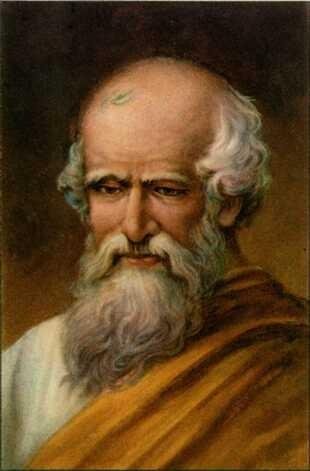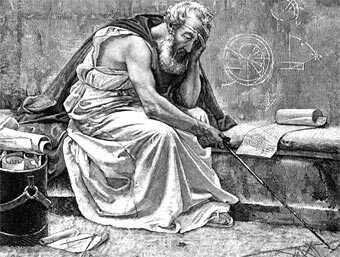Steemhomework for the week! "ARCHIMEDES"
Archimedes
(Syracuse, current Italy, h. 287 a.C. - id., 212 a.C.) Greek mathematician. The great progress of mathematics and the astronomy of Hellenism are largely due to previous scientific advances and the legacy of Eastern knowledge, but also to the new opportunities offered by the Hellenistic world. At the beginning of the Hellenistic period is Euclid, who bequeathed to posterity a prolific work of synthesis of the knowledge of his time that fortunately was almost intact and became an almost indispensable reference until the Contemporary Age.

[source](http://campamentomestizo.wikia.com/wiki/Arquímedes)
But the most famous and prestigious mathematician was Archimedes. His writings, of which a dozen have been preserved, are eloquent proof of the multifaceted nature of his scientific knowledge. Son of the astronomer Phidias, who probably introduced him to mathematics, he learned from his father the elements of that discipline in which he was destined to surpass all ancient mathematicians, to the point of appearing as prodigious, "divine", even for the founders of modern science. His studies were perfected in that great center of the Hellenistic culture that was the Alexandria of the Ptolemies, where Archimedes was, around 243 BC, disciple of the astronomer and mathematician Conon de Samos, for whom he always had respect and admiration.
There, after learning the not insignificant mathematical culture of the school (the great Euclid had recently died), he strengthened friendly relations with other great mathematicians, among whom was Eratosthenes, with whom he always corresponded, even after his death. return to Sicily. To Eratosthenes Archimedes dedicated his Method, in which he exposed his brilliant application of mechanics to geometry, in which he "weighed" imaginary unknown areas and volumes to determine their value. He then returned to Syracuse, where he devoted himself fully to scientific work. Apparently, he later returned to Egypt for some time as "engineer" of Ptolemy, and designed there his first great invention, the "coclea", a kind of machine that served to elevate the waters and to irrigate in this way regions to which the flood of the Nile did not arrive. But its mature activity of scientist completely evolved in Siracusa, where it enjoyed the favor of the tyrant Hierón II. There he alternated mechanical inventions with studies of theoretical mechanics and high mathematics, always printing on them his characteristic spirit, marvelous fusion of intuitive daring and methodical rigor.
His mechanical inventions are many, and even more those attributed to him by the legend (among the latter we must reject the one of the ustorios mirrors, immense mirrors with which the Roman fleet that besieged Siracusa would have burned); but they are historical, besides the "coclea", numerous war machines destined to the military defense of the city, as well as a "sphere", great and ingenious mechanical planetarium that, after the capture of Syracuse, was taken to Rome as booty of war, and there was still seen Cicero and perhaps Ovid.

Archimedes in his representation more
Traditional: abstracted and meditative
The biography of Archimedes is more populated by tasty anecdotes than by events such as those previously reported. Around him the plot of a legendary figure was woven first by his fellow citizens and by the Romans, then by the ancient writers and finally by the Arabs; and Plutarch attributed a "superhuman intelligence" to this great mathematician and engineer.
The most publicized of these anecdotes is related by Vitruvius and refers to the method he used to verify if there was fraud in the confection of a gold crown commissioned by Hiero II, tyrant of Syracuse and protector of Archimedes, and perhaps even his relative. It is said that the tyrant, suspecting that the jeweler had deceived him by placing silver inside the crown, asked Archimedes to determine the metals of which he was composed without breaking it.
Archimedes meditated for a long time on the difficult problem, until one day, when he was in a bathing establishment, he noticed that the water overflowed from the bathtub as it was being introduced into it. This observation inspired him the idea that allowed him to solve the question posed by the tyrant: if he submerged the crown in a container full to the brim and measured the water that overflowed, he would know its volume; then he could compare the volume of the crown with the volume of a gold object of the same weight and see if they were equal. It is said that, driven by joy, Archimedes ran naked through the streets of Syracuse to his home shouting "Eureka! Eureka! ", That is," I found it! I found it!".
The idea of Archimedes is reflected in one of the initial propositions of his work On floating bodies, pioneer of hydrostatics, which would be carefully studied by the founders of modern science, including Galileo. Corresponds to the famo
The idea of Archimedes is reflected in one of the initial propositions of his work On floating bodies, pioneer of hydrostatics, which would be carefully studied by the founders of modern science, including Galileo. Corresponds to the famous principle of Archimedes (every body submerged in a liquid undergoes an upward thrust equal to the weight of the volume of water it dislodges), and, as explained there, making use of it it is possible to calculate the law of an alloy, which allowed him to discover that the goldsmith had committed fraud.
According to another famous anecdote, collected among others by Plutarch, Archimedes was so enthusiastic about the power he could get with his machines, capable of lifting large weights with relatively small effort, which assured the tyrant that, if they gave him a point of support, I would get to move the Earth; it is believed that, exhorted by the king to put his assertion into practice, he managed without apparent effort, by means of a complicated system of pulleys, to set in motion a three-masted ship with its cargo.
Analogous mental concentration and meditation abstraction demonstrates the episode of his death. According to it is said, the warlike devices whose paternity attributes the tradition allowed Siracusa to resist three years the Roman siege, before falling into the hands of Marcelo's troops. While Marcus's soldiers plundered Syracuse, who had finally managed to expunge the city, the old mathematician was meditating, forgotten about everything, in his problems of geometry. Surprised by a soldier who asked him who he was, Archimedes did not answer him, or, According to another version, he replied irritably that it would not bother him or spoil the drawings he had drawn in the sand; and the soldier, angered, killed him. Marcelo was very sad to hear it and ordered that a monument be erected, taking his figure out of the treatise On the sphere and the cylinder. Cicero recognized by this figure, many years later, his forgotten tomb.
This passion of Archimedes for erudition, which caused his death, was also the one that, in life, is said to have made him forget even to eat and that he used to entertain himself by drawing geometrical drawings in the ashes of the home or even, when anointing himself, in the oils that covered his skin. This image contrasts with that of the inventor of war machines that historians Polibio and Livy speak of; but, as Plutarch points out, his interest in that machinery rested solely on the fact that he proposed his design as mere intellectual entertainment.